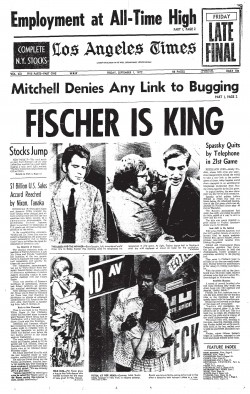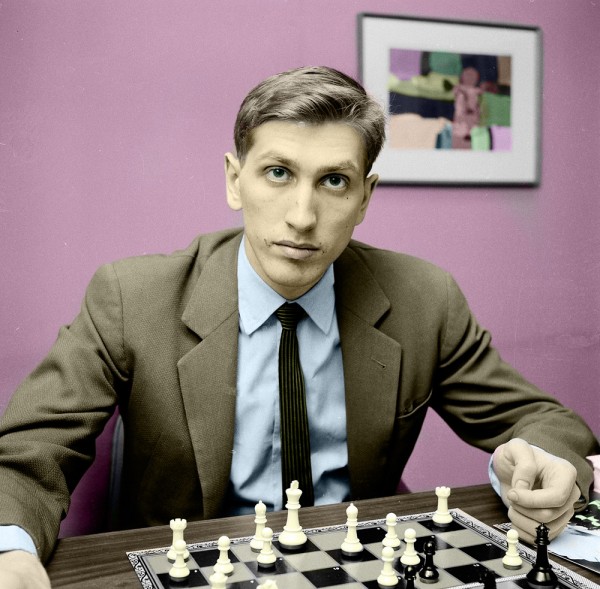TIME: Bobby Fischer was only 29 when, in the midst of the Cold War, he defeated the Russian defending champion Boris Spassky in the World Chess Championship on September 1, 1972, ending 24 years of Soviet dominance in the intense, rarefied realm of big-league chess. The match, held in Reykjavik, Iceland, was a massively hyped event — “The Match of the Century” — with a build-up worthy of a Super Bowl or the Olympics and the sort of pre-battle media conjecture usually reserved for heavyweight title bouts. Which, in a sense, the match was.
That Fischer was a genius, with one of the most innovative and thrilling minds ever to address a chess board, is largely undisputed. He played in eight U.S. chess championships — and won all eight, decisively. In 1956, when he was just 13, he defeated the celebrated American chess master, Donald Byrne, in what Chess Review pegged as “The Game of the Century.” He routinely won international matches by record margins, and in the early 1970s was the number-one rated player in the world for more than four years.
But as renowned and imaginative a Chess Master as Fischer was, in later years his bizarre behavior and his increasingly strident political views (virulently anti-American and anti-Semitic, for the most part, although his mother was Jewish) overshadowed  his brilliance and his accomplishments. When he died in 2008, he was living in Iceland — the scene of his greatest professional triumph — where he had been granted full citizenship in 2005. The American Chess Federation had permanently revoked his membership years before, after he publicly applauded and defended the September 11, 2001, terror attacks as utterly justified and predictable payback in light of America’s policies in the Middle East and elsewhere around the globe. (“The U.S. and Israel have been slaughtering the Palestinians for years,” he said shortly after 9/11.) MORE
his brilliance and his accomplishments. When he died in 2008, he was living in Iceland — the scene of his greatest professional triumph — where he had been granted full citizenship in 2005. The American Chess Federation had permanently revoked his membership years before, after he publicly applauded and defended the September 11, 2001, terror attacks as utterly justified and predictable payback in light of America’s policies in the Middle East and elsewhere around the globe. (“The U.S. and Israel have been slaughtering the Palestinians for years,” he said shortly after 9/11.) MORE
NEW YORK TIMES: The world championship match against the elegant Spassky was an unforgettable spectacle, the cold war fought with chess pieces in an out-of-the-way place. Mr. Fischer’s characteristic petulance, loutishness and sense of outrage were the stuff of front page headlines all over the globe. Incensed by the conditions under which the match was to be played — he was particularly offended by the whirr of television cameras in the hall — he lost the first game, then forfeited the second and insisted the remaining games be played in an isolated room the size of a janitor’s closet. There, he roared back from what, in chess, is a sizable deficit, trouncing Mr. Spassky, 12 ½to 8 ½. (In championship chess, a victory is worth one point, a draw a half-point for each player.) In all, Mr. Fischer won 7 games, lost 3 (including the forfeit) and drew 11.
Through July and most of August, the attention of the world was riveted on the Spassky-Fischer match. Americans who didn’t know a Ruy Lopez from a Poisoned Pawn watched a hitherto unknown commentator named Shelby Lyman explain each game on public television. All this was Mr. Fischer’s doing. Bobby Fischer the rebel, the enfant-terrible, the tantrum-thrower, the uncompromising savage of the chess board, had captured the imagination of the world. Because of him, for the first time in the United States, the game, with all its arcana and intimations of nerdiness, was cool. And when it was over, he walked away with a winner’s purse of $250,000, a sum that staggered anyone ever associated with chess. When Mr. Spassky won the world championship, his prize was $1,400. MORE

